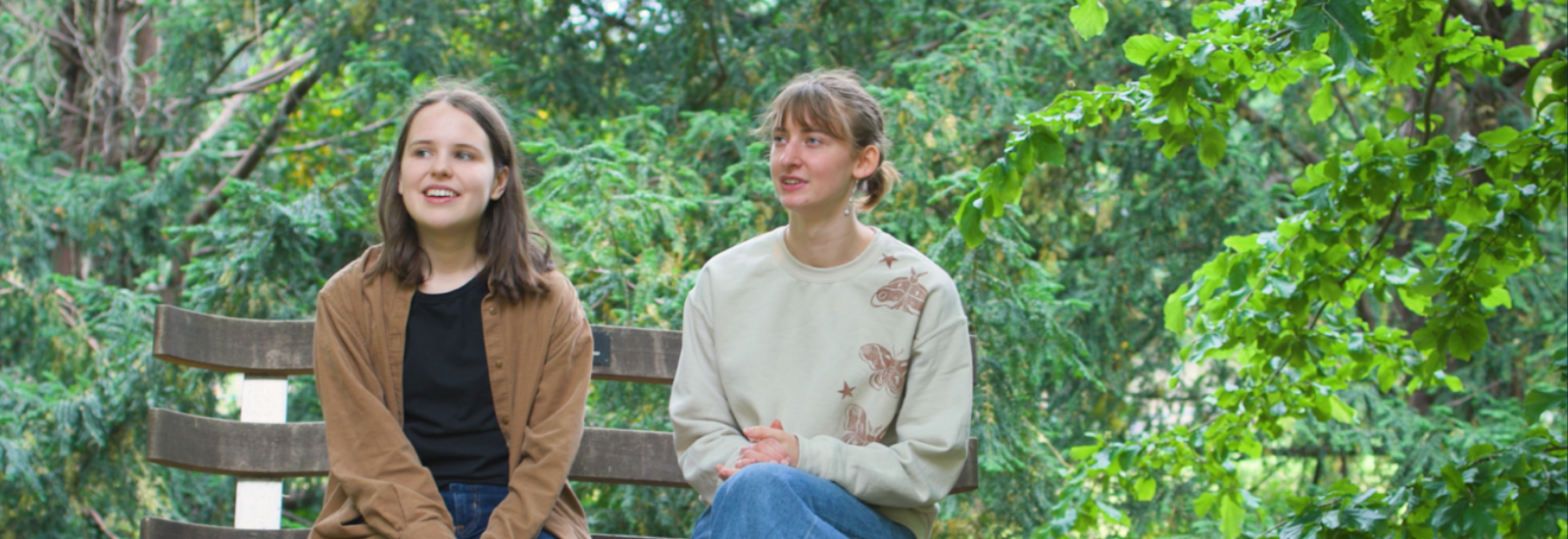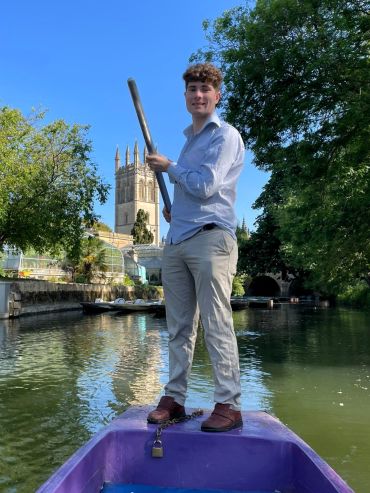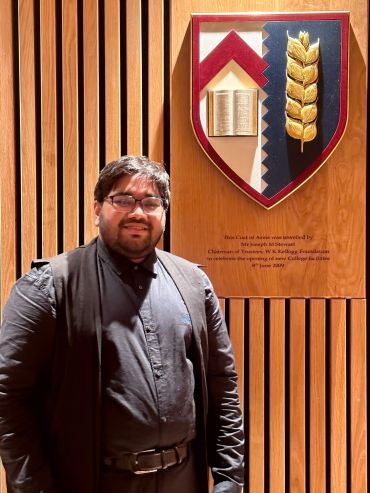
Student experiences
At Oxford, every student's journey is different. This page shares stories from some of our disabled students who’ve spoken openly about their experiences, including their challenges, growth, and what has helped them along the way.
Whether you're thinking about applying, getting ready to arrive, or already here, we hope these stories offer support, encouragement, and a sense of connection.
More content — will be added soon. For now, you can explore the tabs above to hear directly from students.
To find out more about the support available, visit the Disability page on the Oxford Students website. You can also contact the Disability Advisory Service at [email protected] with any questions.
"Hey, I’m Conor. I’m a finalist law student at Magdalen College, but am currently rusticated (where a student suspends their studies). At the start of my second year at Oxford, I was diagnosed with ADHD.
 Conor punting on a river in Oxford with Magdalen College tower in the background.
Conor punting on a river in Oxford with Magdalen College tower in the background.These struggles led my tutors to encourage me to seek out student support. I received support from various sources at the University and college levels. I found myself talking to mentors, deans, and counsellors, often feeling like I was discussing the same issues with little improvement. This was until the end of my first year, when one of those supporters suggested a reason why I might be struggling so much: that I had ADHD.
Back home in Dublin, I was one of the most intelligent people in my school. Then I came to Oxford, and it felt like my worldview had shattered. I was unable to organise myself in the less structured environment and felt utterly overwhelmed.
ADHD was not really something I ever thought applied to me. I’d thought ADHD was only for hyperactive schoolboys. Growing up and constantly being told how clever I was made me think there could be nothing abnormal about my brain. It was only upon looking back that I started to see the signs.
I spent the summer getting a diagnosis. I was lucky enough to be able to go through a private clinic, which made the process speedier. I recognise this isn’t an option everyone has. By the start of my second year, it felt like things were looking up. I knew what the “problem” was, and I was on medication to “fix” that “problem”.
When I told one of my tutors about my diagnosis, he said something that has stuck with me ever since. I don’t remember the exact words, but it was something like: knowing this will make it easier, but things will still be hard.
And things still have been hard.
Oxford support has been a lot like my ADHD medication; it has brought things from impossible to possible, but it hasn’t made it easy. The support is just that: support. It can help you with the hard stuff, but can’t do it for you.
That being said, the University provides an immense amount of support, such as assistive technology, academic skills tutors, counselling, and various support workshops.
Oxford support has been a lot like my ADHD medication; it has brought things from impossible to possible.
If I were to give a few recommendations for engaging with this support, it would be these:
Do it early: It can feel scary to ask for help, at Oxford, even more so. But trust me, the earlier you engage with this kind of stuff, the more progress you will be able to make. Support is not a magic wand that fixes everything; it is something you have to put time into to see results.
Don’t do too much: The immense amount of support Oxford provides can be both a blessing and a curse. At one point, I was meeting three different support staff at a time, often discussing very similar things. Oxford life is already busy enough, and while support is essential, it’s equally important not to let it interfere too much with your academics. A more focused approach can, in my experience, be more helpful. For example, I now meet two people: a college mentor to discuss general academic skills, and a University counsellor to discuss personal and mental health issues.
Do utilise the Counselling Service: It was actually a University counsellor who first suggested to me that I may have ADHD. The Counselling Service has been invaluable in issues relating to neurodivergence, but I have also found it especially useful regarding matters like personal reflection and self-esteem. When we’re struggling, particularly if it’s related to neurodivergence, it can lead us to some pretty unhelpful self-perceptions. Combatting those ideas is essential, not only for our well-being, but also because those self-perceptions can seriously negatively affect our academic work. In addition to individual counselling, the University provides a wealth of workshops to help with specific struggles. Currently, I am participating in a Self-Compassion workshop, which I have been finding very helpful
Do engage with the Careers Service: Personally, I find engaging with careers stuff a bit terrifying. That’s why I really value the University Careers Service. You can book one-on-one meetings with specialist careers advisers who can help you with interview prep, reviewing applications, etc. The Careers Service also provides Health/Disability Careers Appointments to discuss careers issues related to health, disability, and neurodivergence.
Do make sure you have support during the vacation: While the support services in Oxford are excellent, some of them are limited to term time*. The adjustment can be difficult when certain support services are no longer availble, especially when you’re still expected to get work done over the vacation period. That’s why it’s important to ensure you have additional support systems, in combination with the available support from the university, whether that be friends, family, or simple self-reflection.
...You’re at this university because you are incredibly smart, and you can use those smarts to engage with neurodivergence.
Engaging with neurodivergence outside of University support services has also been incredibly helpful. Sometimes we can forget it, but you’re at this university because you are incredibly smart, and you can use those smarts to engage with neurodivergence. For example, I took a module in Disability and Equality last year. During that seminar, we discussed ideas similar to those I heard from University support services. Still, there’s something about reading those ideas in an academic paper that makes them easier to internalise. That module certainly made me more accepting of my ADHD. There’s plenty of extracurricular stuff relating to disability and neurodivergence to get involved with as well. Being the Student Chair of the Herbert Smith Freehills Disability Mooting Championship 2024 showed me that things I once thought impossible were very much achievable.
I look forward to returning to Oxford next year, having learned even more about myself and my neurodivergence. While having ADHD at Oxford is certainly not easy, the University provides a wealth of support to students who are struggling."
*University Student Welfare and Support Services remain open over the vacations, with some adjusted open hours. Please check individual service pages for full details, and with your college and department for their support arrangements during this time.
"I’m Md Taqi Yasir, a part-time MSc student in Educational Assessment at the University of Oxford and a lecturer at the Department of English, Jahangirnagar University in Bangladesh. Coming to Oxford has been one of the most transformative experiences of my life. It has allowed me to explore assessment through a global lens while connecting with a diverse academic community.
 Taqi stands smiling in front of a wooden wall featuring the Kellogg College coat of arms.
Taqi stands smiling in front of a wooden wall featuring the Kellogg College coat of arms. [DAS] support... helped me manage stress around assessments, allowed for more flexible arrangements... and... reassured me that I wasn’t navigating these challenges alone.
I live with a neurological condition called hemifacial spasm, which causes involuntary facial muscle contractions. Managing this condition alongside postgraduate studies and full-time work back home was not always easy.
I disclosed my circumstances during the first year of the course, once I realised that my condition was beginning to affect my participation and focus. I reached out to the Disability Advisory Service (DAS), and they worked with me to set up a Student Support Plan tailored to my needs. Their support made a real difference, it helped me manage stress around assessments, allowed for more flexible arrangements when needed, and most importantly, reassured me that I wasn’t navigating these challenges alone.
Looking back, I do think the process of accessing support could be made clearer, especially for international or part-time students who may not always be aware of what’s available. But once I made contact, I found the team to be thoughtful and compassionate throughout.
Oxford has taught me that academic excellence and personal resilience go hand in hand.
Outside of my studies, I’ve stayed connected with seminars and academic events, as well as maintained my teaching responsibilities at my home university. Balancing both roles has been demanding, but it’s helped me apply theory to practice and made my Oxford experience feel even more purposeful.
Looking forward I hope to use my experience at Oxford to help improve assessment practices in my country, particularly in higher education. I want to focus on fairness, reliability, and accessibility, especially for students who may be facing challenges similar to mine.
The support is there, and accessing it can make all the difference, not just in your studies, but in your overall wellbeing.
To students beginning their own journey, whether at Oxford or elsewhere, my advice would be: reach out early and don’t hesitate to ask for support. There’s strength in knowing your limits and advocating for yourself. The support is there, and accessing it can make all the difference, not just in your studies, but in your overall wellbeing.
Oxford has taught me that academic excellence and personal resilience go hand in hand. I’m grateful for the support I received, and I hope my story encourages others to seek the help they need and deserve."
Starting university as an autistic student? Here are some tips from Student Minds:
Change is hard – and that’s okay
Give yourself credit for the extra energy it takes to adjust. Take rest breaks, and try not to do too much in one go.
Your choice to disclose
Declaring your autism can open up avenues of support – for example, you may be eligible for a specialist mentor through the Disabled Students' Allowance (DSA). But disclosure is a personal decision, and you should only share what you're comfortable with.

Find safe spaces
If the campus environment feels overwhelming, you can ask your university about quiet spaces or low-stimulation environments. You might also find comfort in libraries or request a designated space to relax when needed.
Making friends
Join societies or clubs to meet like-minded people in a structured way. Don’t worry if you don’t immediately click with flatmates – you’ll meet plenty of people throughout your time at uni.
See the positives
Many autistic students thrive at university. Focus, attention to detail, and deep interest in subjects are strengths worth celebrating. Recognise your wins, however small, and connect with others who understand and support you.
For more support and resources, visit Student Minds.
(Shared with permission from the Instagram campaign for #AutisticPrideDay)